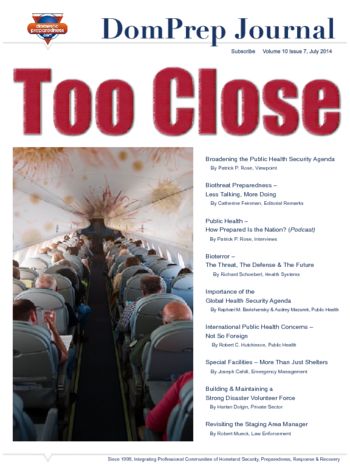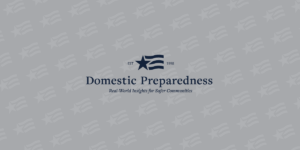

Biothreat Preparedness – Less Talking, More Doing
Catherine L. Feinman
July 30, 2014
An article, a flash poll, and a podcast each addressed the same question: Where does the nation
stand on preparedness for biological threats? As the world watches to see how West Africa manages the
latest Ebola outbreak, public health officials must continue to train, educate, staff, and fund their
forces to be ready when they too must face a major biological threat.

Bioterror – The Threat, The Defense & The Future
Richard Schoeberl
July 23, 2014
Adequate defense for a bioterrorism attack requires fortification of the public health infrastructure as well as the establishment and continuance of a good healthcare system. With the potential to spread rapidly with and between communities, bioagents as weapons pose a significant threat to U.S. communities that require greater attention on a national scale.

Building & Maintaining a Strong Disaster Volunteer Force
Harlan Dolgin
July 23, 2014
To meet the challenges of preparing for potential medical disasters and biothreats, health departments across the nation must work with many dedicated volunteers to provide emergency shelters,
vaccinations, and other medical care. When organizations like the Medical Reserve Corps recruit, train, and maintain these volunteers, the benefits in lives saved could be immeasurable.

Revisiting the Staging Area Manager
Robert Mueck
July 23, 2014
Modern communication methods and social media enable rapid transfer of information. As a result, there is often an influx of responders and onlookers when an incident occurs. To manage those who were not dispatched to the scene, a staging area manager can help establish a check-in post, organize and track resources, and share information with the command post.

Special Facilities – More Than Just Shelters
Joseph Cahill
July 16, 2014
Many emergency plans call for the establishment of special facilities – each serving a primary function(s) to protect the population – in order to fulfill the public’s needs during or

International Public Health Concerns – Not So Foreign
Robert C. Hutchinson
July 16, 2014
Middle East Respiratory Syndrome (MERS), Lassa fever, and other pathogenic infections are just a few of the biothreats that recently have grabbed national attention in the United States. What were once considered foreign diseases are not so foreign in a globalized economy. As such, a national strategy for biosurveillance must effectively reach all levels of the public and private sectors.

Importance of the Global Health Security Agenda
Raphael M. Barishansky and Audrey Mazurek
July 16, 2014
Increased intercontinental travel and increased biological, pandemic, and other disease threats mean that countries must effectively cooperate and communicate to prevent the spread of disease within and between interconnected communities. The Global Health Security helps bring together global partners and address key issues related to preventing, detecting, and responding to such public health threats.

Broadening the Public Health Security Agenda
Patrick P. Rose
July 9, 2014
In 2001, almost 3,000 people died after the 9/11 attacks. In 2005, more than 1,800 people died because of Hurricane Katrina and the subsequent floods. Receiving less attention, in the United States alone, more than 3,000 people die of influenza each year. With other public health threats having already crossed the border, it is time to connect the dots and better address national public health security.

Division of Strategic National Stockpile (SNS) Course
Domestic Preparedness
July 8, 2014
The Strategic National Stockpile Preparedness Course is a 3-day course designed to give federal, state, and local officials information on how to best plan and prepare for a public health emergency and how to use and manage the Strategic National Stockpile in response to a terrorist attack, natural disaster, or technological accident.

Hospital Emergency Response Training (HERT) for Mass-Casualty Incidents
Domestic Preparedness
July 4, 2014
Hospital Emergency Response Training (HERT) for Mass Casualty Incidents is a three-day course designed to provide medical operation guidance to hospitals, emergency medical services (EMS), healthcare facility personnel, and others who may become involved in a mass-casualty incident (MCI).

